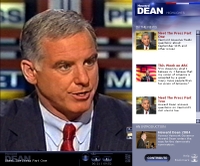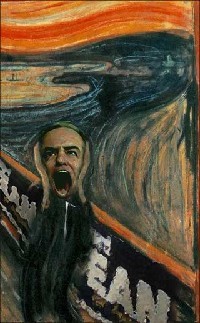We are approaching an interesting anniversary.
On March 15 it will be 4 years since Howard Dean stepped before the California Democratic convention and gave his "I’m here to represent the Democratic wing of the Democratic party" speech.
It holds up fairly well. In some sections, extraordinarily well. But what is most remarkable about it is how it has since been accepted by nearly all Democrats.
- Every major Democrat is now against the War in Iraq.
- Every major Democrat is now for expanding health insurance.
- Every major Democrat now talks about increasing the youth vote.
- Every major Democrat now opposes Bush’s education policy.
Dean’s approval of civil unions now draws majority support. His call for expanding wilderness is now considered Democratic kant. And, of course, his ideas about using the Web and rebuilding the Democratic grassroots now have Republicans on the run across the country — even in parts of the South.
Few Presidents have succeeded in moving politics this sort of distance in so short a time. Barry Goldwater is comparable, but movement conservatism did not have the same hold on the Republican Party in 1967 that Dean’s stands do among Democrats today.
Four years ago Howard Dean was considered a "left-wing" and "fringe" candidate, even within his own party. Now he is the party’s chairman, and its candidates all echo his themes. Why else would Hillary Clinton announce her candidacy online — that’s the netroots effect.
Even the fatal flaw of the Dean campaign, his refusal to upgrade to a Community Network Service platform from a blog, may be seen by history as a long-run masterstroke.
Because Dean gave up the web, the two consultants who presented this idea to him, Markos Moulitsas and Jerome Armstrong, now run the virtual Democratic clubhouse. They do this at no cost to the party and bring something vital to the work — credibility. Their spin is their own, they criticize the party without fear, and their software lets ordinary users spin as well. A campaign or even a party apparatus would be too goal-oriented to allow this kind of free-wheeling discussion and debate.
The success of these sites has led to dozens of others — Firedoglake, DownWithTyranny, Americablog, Glenn Greenwald, and all the rest. Each is individual, each is free to the party, each brings its own credibility to bear on the subjects it covers, each is important.
Just as important to the success of the party has been the rise of state-based sites inspired by Kos and Jerome, such as Bluegrassreport in Kentucky and BlueNC in North Carolina. It is no coincidence that these are now the two bluest states in the South — North Carolina went from being among the reddest in 2004 to among the bluest in 2006 as Jerry Meek employed a Dean-like program. (Meek even has a "100 county" strategy to match the DNC’s "50 state" effort.)
Could Howard Dean have won in 2004? I have to say I doubt it. His nomination would have split the Democratic party, because his strategy was to confront it. And his defeat to Bush would have left him right where Kerry is now, which is nowhere.
Instead he sacrificed his own political ambition, he came to the aid of his party, and he gave it fire. Howard Dean is the first failed Presidential candidate since Reagan to gain in political strength after running.
How was he able to do this? How was Howard Dean, a governor from the back of beyond, able to put aside his own considerable ego (no one runs for President without one) and build a majority from the ashes of The Scream?
It was because he knew something important, something he preached again-and-again throughout his campaign. He doesn’t matter.
You have the power.













I’m not sure Dean could have won in 2004, but I think he had a much better chance than Kerry. The Kerry nomination was the Democratic Party serving leftovers at their meet the parents dinner. Kerry was only attractive in that he was not Bush and that clearly wasn’t enough for the swing votes. Kerry was by far the weakest of the top Democratic candidates and by going with the lowest common denominator the Party cost themselves what could have been an easy win in the presidential election.
I’m not sure Dean could have won in 2004, but I think he had a much better chance than Kerry. The Kerry nomination was the Democratic Party serving leftovers at their meet the parents dinner. Kerry was only attractive in that he was not Bush and that clearly wasn’t enough for the swing votes. Kerry was by far the weakest of the top Democratic candidates and by going with the lowest common denominator the Party cost themselves what could have been an easy win in the presidential election.
Great post, and I quite agree that the “you have the power” message was the most important part of the whole Dean phenomenon. Above all the rest – and it was hard for me to find things I didn’t like about Dean – it was hearing a major political candidate say this.
I always thought Dean’s understanding of the importance of this idea must come from his political history in a small state with a lot of neighborhood-level political participation. In a state like Vermont, where lots of people are in the habit of going to town meetings and it’s perfectly normal to see the governor at a high school hockey game, the illusion of some kind of essential difference between the government and the governed perhaps cannot as easily take hold.
Great post, and I quite agree that the “you have the power” message was the most important part of the whole Dean phenomenon. Above all the rest – and it was hard for me to find things I didn’t like about Dean – it was hearing a major political candidate say this.
I always thought Dean’s understanding of the importance of this idea must come from his political history in a small state with a lot of neighborhood-level political participation. In a state like Vermont, where lots of people are in the habit of going to town meetings and it’s perfectly normal to see the governor at a high school hockey game, the illusion of some kind of essential difference between the government and the governed perhaps cannot as easily take hold.